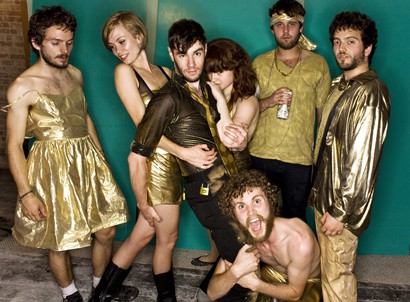by Haley Cullingham
Foxfire come out of orbit to talk about art, music, and themselves.
Walking in to Foxfire’s basement rehearsal space on Richmond is like walking into the coolest debauchery-garage in the space-time continuum. Prince posters are peeling from the walls, empty forties are rolling on the floor. The letters on the Marshall stacks are rearranged to spell people’s names. Cigarette smoke, lazy guitar riffs and keyboard notes fill the air, barely making a dent in the debates going on around me. Urban sprawl, Fellini movies, Toronto’s cultural probability: the seven members of Foxfire are like the New York Times of drunk indie bands: All the News That’s Fit to argue about in between sprawling sets of unexpected music. But they’re also incredibly cohesive: in conversation, as in their music, they operate as a singular many-headed unit, ebbing and flowing, building off one another. Sometimes they back off to let each other shine, other times they all crash together in a cacophany that works with it’s own chaos.
When that chaos arranges itself into music; built by seven very different people with very different musical backgrounds, you get the reason that Foxfire (collectively Alex, Anna, Andre, Hannah, Joe, Neil and Sean) is special. “Every single one of us comes from a totally different musical background. Every single one of us.” Their “folk songs from the future” exist at an intersection between old and new: a place where extensive knowledge of the past means creating something for the future. Foxfire, unlike most bands today, are actually creating, not attempting to emulate a concept that has worked in the past. They’ve taken a mixture of different influences and combined them into something unique. “What we’re just trying to do is have a fun time, play good music, and start a fucking party.”
The thing about Foxfire is they have an element of something unique. When you’re jammed into an over-air-conditioned practice space 3 feet away from them, that element becomes something tangible, like a physical force sitting in the room powered by the seven of them and their proximity to one another. But maybe that’s too lofty. What they’re all about is “seeing the kids dance.”
As a band, their list of inspirations reach up, out, around, and back, from architecture and topographical art to “people in general.” Names of films and directors are thrown around, from Blade Runner and the Godfather to Akira Kurosawa, the Japanese director who once spent days holding up filming to make sure the clouds were in exactly the right place. Is it this struggle for an absolute translation of concept to creation that links them to Kurosawa? Maybe, but it’s more about the synergy between the members of Foxfire themselves. “I like to think of us as the Seven Samurai,” says Joe, straight-faced behind his beer can.
The band as a whole were raised in Toronto, and like Broken Social Scene, something about the city’s mayhem of cultural and aesthetic mosaic is absorbed into their music. In the same way that Toronto isn’t quite like anywhere else, neither is Foxfire’s sound. They’re making “music that can transcend right now, because I don’t feel like I’ve heard a lot of records lately where I could listen to them in 20 years.” They’re confident about their goals as a band, and the conversation doesn’t go very long without returning to the music. “We’re not about being the next big thing or anything, we’re just about being good at what we’re doing.” And they are. The songs are tight and complex, often taking unexpected turns in genre or direction but never straying too far outside of themselves. Their songs harken back to a time when “musicality was key,” and had a soul, no matter what that soul sounded like. Says Neil, “People latch onto that.”
People are latching on to Foxfire. Whether it’s their sound, energy, or style, or a combination of all three, they’re taking over the city. Go see them at Wrongbar this Thursday with The Whip and DJ Vaneska, get drunk, and have a party. “[We] just want to make music people are gonna fuck to.”




 Follow Us On Instagram
Follow Us On Instagram
